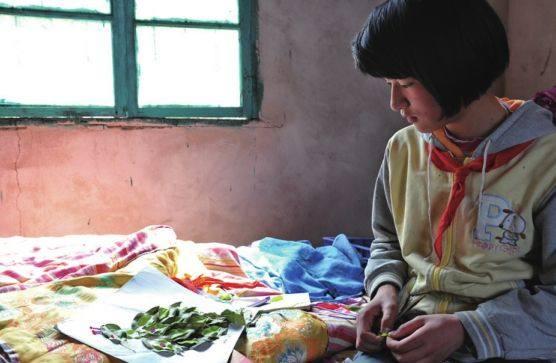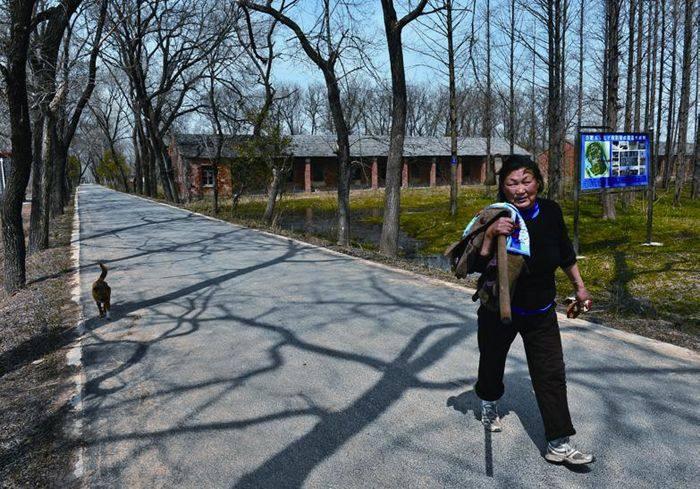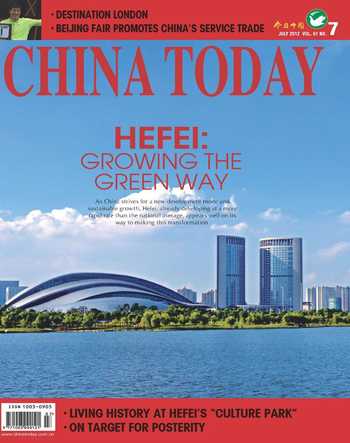Duji, an ecological township
By LI YUAN
CHINA faces serious challenges as a latecom- er to the globalization process as regards its environment and ecological resources. The Chinese, along with people throughout the world, must now deal with the disastrous consequences of industrial emissions generated over the past two centuries in the West. The concept of lowcarbon development as the sole means through which to meet this challenge has now diffused from urban to rural areas of China.
The Duji Eco-tourism Zone is located in Duji Township, Changfeng County, Anhui Province, 60 kilometers from provincial capital Hefei.
Farming has long dominated Duji Township in its remote location in Changfeng County, but now tourism is becoming a source of local revenue. This new string to Dujis economic bow originates in a senior resident and his bird island.

Bird Island Keeper
There is nothing superficial to distinguish 67-year-old Duji local Lu Fengkui from other farmers in the township. He is nonetheless something of a local celebrity by virtue of the location of his home – a luxuriantly green eco-island that resounds with birdsong from the many feathered fauna that roost there.
Lu Fengkuis home in the early 1960s was on a desolate benchland that the ancient Huangpei River
meandered through from its source in Dingyuan County in eastern Anhui. After heavy rains the river would regularly burst its banks and wash down the Lu households thatched cottage. After suffering these privations for years, Lu Fengkuis father one day mobilized everyone in his poverty-stricken family into diverting the rivers course. This was no easy task, but their labors were eventually rewarded, and brought dividends in the form of an islet where the river had formerly flowed. In efforts to make use of this new found land, Lu Fengkuis father would regularly plant them with trees. The task became part of their farm work for the next two decades, one that Lu maintained after his fathers death in 1993. Lu seniors perseverance inspired his son to make planting and conserving trees part of his life. A further two decades on, this non-arable benchland is now an eight-hectare green forest surrounded by water on three sides. Its favorable eco-environment and abundance of food has made it an avian sanctuary that attracts many birds to roost and nest.
The story of Lu Fengkuis father and his island spread, and many people have come to see what he and his son had accomplished. Lu Fengkui takes delight in showing visitors around. He and his wife personally prevent bird hunting and poaching by making nightly patrols of the island.
Each year in late March Lu Fengkui and his family members spend around 10 days pruning trees and earthing-up roots.
Their labors are in preparation for the arrival in early April of the egret, white crane, grey crane, bulbul, azure-winged magpie, and more than 20 species of birds that come to the island to nest, lay eggs and raise their young until autumn comes. Their breeding and hence survival requires stable branches and dense trees. If the island could not provide them the birds would simply migrate to other places for good.
Lu Fengkui regards birds as friends that bring life to the forest and protect his vegetable fields from insect pests. He lives by the staple rule of the biosphere that they, in turn, deserve to be protected.
It is Lus sincere desire for a harmonious relationship between human beings and birds that has motivated him to build this sanctuary for thousands of birds.
His work has won him the title of “Top 10 Environment Guards of Hefei” and “Good Person in China” in 2010. Of more significance, though, is the growing number of people that have joined him and his family in treasuring and protecting birds.
The local government planted a 21-hectare area of trees and flowers in 2010, and set up a bird-watching platform and a pedestrian for visitors. It has also established a reserve on the ecological bird island, and stipulates that any development program must first take the living conditions of the birds into consideration. Building a safe, pleasant place for birds to roost and nest is the main aim.
Domino effect

This bird island has made Duji Township well-known and drawn throngs of visitors. The stream of tourists, photographers and organized tours to Duji peaks on weekends and holidays. During the 2011 week-long National Day Holiday the island received more than 6,000 visitors.
The bird island has indeed ignited Dujis eco-tourism indus- try, and the local government is planning to provide more attractions and better services nearby.
“Duji has distinct advantages. Its clean air, luxuriant, well-kept vegetation, plentiful fish and shrimps in the creek are all rare treasures to urban dwellers,” township head Yu Chengchang proudly told us.
Duji Township is located on the northern watershed between the Yangtze River and the Huaihe River. Rape, cotton and other drought-enduring plants are commonly grown there due to its sparse water. Its inland location and inconvenient transportation have discouraged industries from setting up in the area, so there has been no possibility of establishing an industry zone. Duji has long been tagged a poor area. Its unsuitability for industry, however, has been a boon for the ecological environment of the area and laid a sound foundation for an eco-tourism zone.
The local government invited experts from the Hefei University of Technology to plan and design scientific and effective use of Dujis ecological resources and protection of the local environment. After consultation, they finally designated three eco-tourism projects: Huangpei Bird Island as a natural beauty spot, the Cuiyue Lake as a place to go fishing, and the site of“May 7th Cadre School,” where cadres were sent from cities to take part in manual labor during the “cultural revolution”(1966-1976).
The Cuiyue Lake (formerly Duji Reservoir), named for its crescent moon shape and surrounding jade green trees, is in the southern part of Duji Township. It covers 320 hectares and is the habitat of soft-shelled turtles, shrimps, grass carp, chub and other freshwater fish. Its pollution-free environment draws many anglers.
Yu Chengchang pointed out the different parts of the lake zone. They include an entertainment zone on the water that encompasses recreation and sightseeing. Visitors can enjoy local folklore on the Cuiyue Island, sample local dishes, admire rare plants and flowers, go fishing, and pick strawberries and other organic fruits and vegetables.
The site of the May 7th Cadre School will be rebuilt into a special-interest tourism zone. At present, construction of the main building has been completed. It can accommodate 240 guests for dinner, lodging and meetings. The follow-up program is at the bidding stage.
Promised Rose Garden
A rose plantation, invested by Hong Kong Roushikeer Interlocking Gear Development Limited, is under construction between the bird island and the school site. Intended to grow roses both for food and wedding adornments, the company plans to start deep processing roses and the wedding celebration industry.
Roses that grew from seedlings transported from Yunnan are now in bud in the 6.7-hectare or more nursery garden. Yu Chengchang predicts that by December this year, the rose garden will be resplendent and ready to welcome guests.
This eco development improves the quality of locals lives and also enriches them. For the rose planting program, individual landholdings have been integrated into mass production. Farmers thus do not rely solely on selling produce, but receive earnings from government subsidies, land rent, and labor rendered.
Yu Chengchang mentioned that farmers each get a subsidy of RMB 1,500 per hectare from the state and RMB 12,000 per hectare from the rent paid by the company. That means that, together with what they earn from their work out of town or at a local company, they can lead a good life. All are satisfied with the present pattern.
The tourism industry has also motivated the sales of local produce. “This has little influence on government revenues, but brings great benefits to local farmers,” Yu said.
The whole township is now working together to achieve a sustainable ecological environment. With afforestation, more than 14,000 trees have been planted in the 19 hectares of newly-leveled soil along the roads and in the eco-tourism zone. A new exit leading to the eco-tourism zone will be opened on the Hefei-Xuzhou Expressway, and two stations on the HefeiBengbu Railway will be added within Changfeng County to provide convenient transportation.


